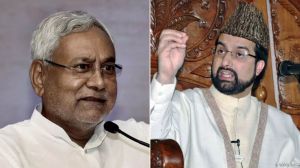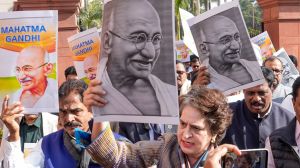In November 2008, shortly after the Lehman Brothers collapse, Prime Minister Manmohan Singh, on a visit to Doha, told Qatar’s leadership: “The current global financial crisis presents, in many ways, a rare window of opportunity for India and Qatar. The investment requirements of a large emerging economy like India and the vast financial surpluses of an energy rich economy such as Qatar can be married to create a win-win situation for both of our countries.”
Indian officials recall that while the intent was positive, the policy paralysis in the later years of the UPA government adversely impacted the investment outlook for the country. Qatar’s desire to invest in India from its Sovereign Wealth Fund was one of the many casualties.

Almost eight years later, the visit of Prime Minister Narendra Modi to Qatar in June 2016, revived the momentum. But Monday’s dramatic diplomatic standoff between the Saudi Arabia-led coalition and Qatar could slow down or derail efforts to get the economic and trade relationship to grow rapidly.
While the current volume of Qatari FDI in India is modest, Qatar’s Sovereign Wealth Fund and other state-owned entities, as well as Qatari private investors, are looking at investment options in infrastructure in India, including in real estate, roads and highways, airports amd airlines, ports, LNG, petrochemicals and fertilizers, and tourism/hospitality.
There is vast potential for Qatar Investment Authority to substantially increase its investments in India, given India’s huge needs — $ 1 trillion in the next 5 years in infra alone — investment friendly policies, and QIA’s keenness to diversify its global portfolio. India has made efforts to actively engage with QIA and other state-owned and private entities in Qatar, highlighting policies such as ‘Make in India’ and the advantages of investing in India.
The balance of trade is currently heavily in Qatar’s favour. India’s exports have stabilised in the range of $ 900 million to $ 1,000 million. However, imports in value terms have declined sharply in the last 1-2 years due to the decrease in international oil and gas prices. Bilateral trade touched a high of $ 16.68 billion in 2013-14, and fell to $ 9.93 billion in the 2015-16 fiscal.
India’s corporate sector too is increasingly pursuing business opportunities in Qatar. A number of reputed Indian companies, particularly in construction/infrastructure and IT, have operations in Qatar, including L&T, Punj Lloyd, Shapoorji Pallonji, Voltas, Simplex, TCS, Wipro, MahindraTech, HCL, SBI and ICICI. Other Indian banks have limited operations under the Qatar Financial Centre or private exchange houses in Qatar. Qatar Airways now has 102 weekly passenger flights to 13 Indian cities.
Story continues below this ad
While business has been the focus of the relationship, India’s ties with Qatar have largely been founded on energy and economic links, and the presence of the Indian community, which in Qatar numbers over half a million and, as in other GCC countries, is the largest expatriate community. The interest of citizens living and working in Qatar, many of them engaged in projects related to the FIFA World Cup in 2022, is paramount for India.
“Qatar backs political Islam, but this is an Islam that is at once moderate, accommodative, liberal and forward-looking,” said Prof Bansidhar Pradhan from the Centre for West Asian Studies in JNU. Qatar also rejects sectarianism and wants to engage with Iran, much to the discomfiture of Saudi Arabia, Prof Pradhan added.
Prof Pradhan said the crisis in the Middle East would not impact India adversely, and Prime Minister Modi’s “Gulf policy is on very solid ground”. His colleague, Prof A K Pasha, director of Gulf studies at JNU, however, said balancing the relationships in the region would require “diplomatic finesse” of a high order, and “There might be some implications on investments, and the movement of labour could become difficult.”

 An aerial view of Doha’s diplomatic area March 21, 2013. File/Reuters
An aerial view of Doha’s diplomatic area March 21, 2013. File/Reuters





































